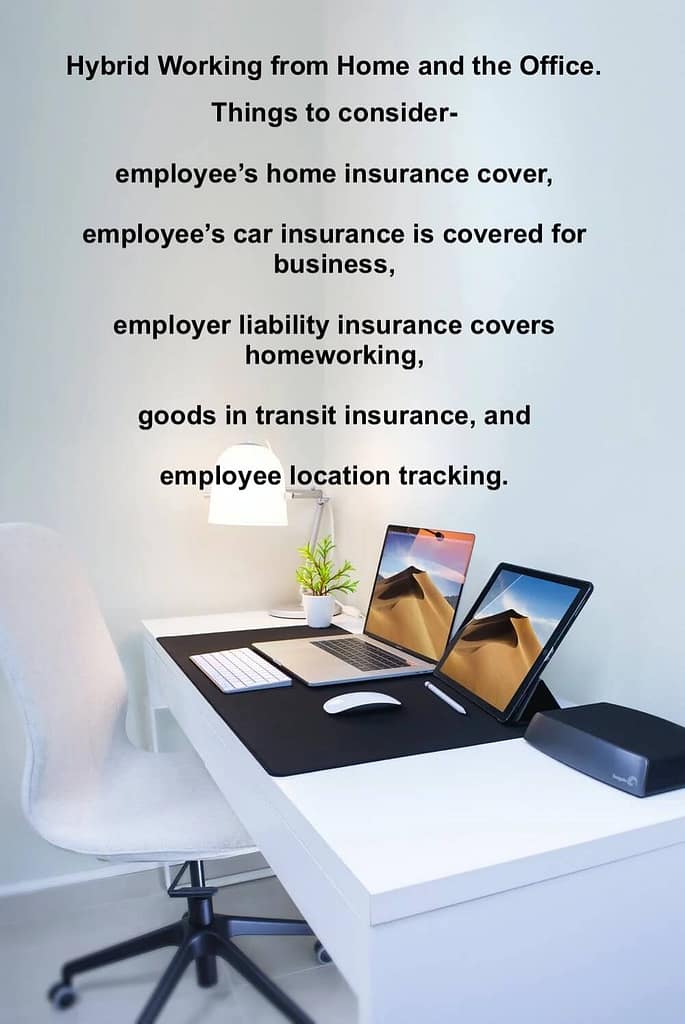Many businesses are now adopting hybrid working modes where employees work part of the week at home and the remainder of their time in the office or another working space. Having largely disproved the suspicion that working from home results in poor productivity levels, the pandemic has given rise to flexible working which now looks to become a permanent arrangement in many organisations.
At the beginning of the pandemic – and with the government actively encouraging employers to let their team members work from home – The Association of British Insurers (ABI) stated the home insurance cover provided by its members will not be affected by working from home while Covid-19 restrictions remain in place.
Now, with restrictions being eased yet at a time when long-term hybrid models are being implemented by many organisations, working from home could have implications in terms of employees’ home insurance.
Although the ABI has stated that office workers who are continuing to work from do not need to contact their insurers, there could be exceptions based on the following scenarios:
- An employee has visitors to their home on business matters, for example, if they have a face to face client meeting.
- An employee makes or sells goods from their home or if they store any of these items at a home, particularly if valuable or includes hazardous or flammable material (such as gas cylinders or fireworks).
- If an employee provides any other services from your home as part of your company’s line of business. For example, this would apply to jobs such as providing beauty treatments, hairdressing, child minding, dog grooming or being an exercise instructor.
- If an employee has adapted their property (e.g. using an outbuilding as their home office or undertaking any major renovation works).
- If an employee has acquired new business equipment that belongs to your business. Cover for any business equipment (e.g. a laptop) will usually be the employer’s responsibility.
If there is any doubt if your employer liability insurance covers homeworking or if there is anything in an employee’s lease or mortgage preventing them from working from home, it’s a sensible precaution to check with their policy or financial service provider.
Many insurers provide home business insurance package which include policies which cover each of the scenarios we have discussed in this article. As packages and policies can differ, it’s worth speaking to your own business insurance provider to check to what extent your homeworking employees are covered.
Types of business insurance policies include:
Employers’ liability
This is a type of business insurance that must be held by law if you employ others. If you have employees, you’re legally obliged to have employer’s liability insurance that covers you for damages of at least £5m. This will cover you should an employee make a claim against you and your business because they’ve been injured or have fallen ill due to their job.
If you don’t have employers’ liability in place then you could be fined up to £2,500 a day, so it’s a costly mistake to make.
There are some companies that don’t need insurance in place, including family businesses if all employees are closely related to the business owner, so make sure you check whether you need cover.
Here are the most common types of business insurance which could apply to those of your employee who work from home:
Contents insurance
Many home insurance policies automatically cover up to £5,000 of home office equipment, but if employees use any computing or specialist equipment as part of their job, they may need more.
Public liability
If people visit an employee’s home for business purposes, then you’ll need public liability. Even if they only enter an employee’s home briefly, accidents can happen. Public liability insurance covers you for compensation and legal fees if a member of the public sues you for injury or damage to their property. So, if a customer comes into an employee’s home to collect a cake, or a courier drops off some flyers, public liability protects you business if they slip, trip or fall.
Goods in transit
If an employee delivers your product to customers, or collects stock from suppliers, there’s a chance that items could get lost or damaged during the journey. Goods in transit cover limits the financial impact that such an event would place on your business.
It’s also worth checking if an employee’s car insurance is covered for business as well as domestic uses. In most cases standard domestic policies disallow business usage. If an employee uses their car for business purposes, they may have to alter their car insurance policy to cover any miles they travel on top of standard “social only” or “social and commuting” use.
location tracking
If you are an employer who is already providing flexible, hybrid working arrangements or considering do so, it’s key that you know where your team members are during working hours.
We have added a location tracking management feature to our HR management software that enables employees to notify colleagues and their managers of their working location. Although this isn’t a legal requirement, it is good practice and lets employees know that you are looking out for them, wherever they happen to be working and that a duty of care is very much part of your company culture.
Please note that we do not endorse or any recommend any business or home insurance provider. The opinions expressed in this article are those of the author. For advice about insurance, we recommend contacting an independent financial adviser.
Find out more about hybrid working.


